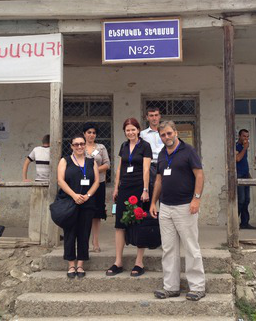
By Andrew Cohen
After spending five days in Nagorno-Karabakh monitoring its recent presidential election, Berkeley Law’s Karin Mac Donald was pleasantly surprised by what she saw.
“A really high level of professionalism and training at all levels of the process,” said Mac Donald, who directs the law school’s Election Administration Research Center (EARC). “On election day, we spent an hour or more at seven different polling sites in three provinces. There was no variation in how everything was administered, and international standards were followed throughout.”
Nagorno-Karabakh, a 1,700-square mile, internationally unrecognized republic of about 140,000 people, broke away from Azerbaijan in 1992. In evaluating the region’s fifth presidential election, a UC observation team used a systematic research methodology designed by Mac Donald. Team members also received valuable research support from EARC’s Bonnie Glaser, who drafted a comprehensive set of questions based on Nagorno-Karabakh’s elections code.
Established in 2005, EARC joined Berkeley Law in 2010. The center works to improve the administration of elections through research, education, training, technical assistance, and public outreach. It studies elections at the national, regional, and local levels, both within the U.S. and internationally, and disseminates its findings to election officials, academic researchers, and the public.
EARC staff members have observed elections in Mexico, conducted seminars on voting accessibility for Mexican election officials, co-hosted and trained a delegation from China during the November 2008 election, and trained individuals in France and other countries on using election data for voting-rights analyses.
In Nagorno-Karabakh, Mac Donald worked mainly with UC Davis professors Keith David Watenpaugh and Heghnar Zeitlian Watenpaugh. They met with elections officials, candidates and their staff, local human rights advocates, journalists, and voters—including a 45-minute sit-down with President Bako Sahakian, who won reelection—and drafted a preliminary report of their findings.
“Keith and Heghnar both speak Armenian and Turkish and I speak German, so it was huge to have those languages covered,” Mac Donald said. “Our team didn’t have to rely on translators. We could talk to poll workers and regular voters without having to wait for people from the foreign ministry to accompany us.”
Runner-up Vitaly Balasanyan, a hero of Nagorno-Karabakh’s war with Azerbaijan, tallied 33 percent. In a region where past incumbents routinely cleared 80 percent of the vote, Balasanyan’s showing was seen as a marked improvement in the democratic nature of the region’s electoral environment.
Some red flags
The preliminary report did raise concerns, however, including accounts of voter intimidation and allegations of military voting fraud. Other areas for improvement: a lack of absentee voting, poor access for disabled voters, and alleged misuse of administrative resources for Sahakian’s reelection campaign.
“There is certainly progress to be made in those areas,” Mac Donald said. “But in terms of abiding by its election code provisions and showing the world it was capable of strengthening its democratic institutions, Nagorno-Karabakh did extremely well.”
An advocate for more stringent election monitoring worldwide, Mac Donald gave higher marks to Nagorno-Karabakh’s poll workers than to those who evaluated them. Polling-site logs—which record when election monitors enter and exit the premises—revealed an average stay of just five minutes.
“In evaluating an election, there’s a long list of items that monitors should be checking,” Mac Donald said. “Yet too often it seems that if these monitors don’t witness any major disturbances or glaring irregularities right away, the result is a quick visit and a glowing review.”
Nagorno-Karabakh poll workers receive training that lasts nearly a week. They have to pass a test to become certified, and three days before the election they view a refresher video followed by a Q&A session. “I was floored by the incredible amount of uniformity in implementing these election procedures,” Mac Donald said. “There were no inconsistencies.”
In addition to thoroughly reviewing the voting process, the UC group also followed ballots and reporting materials to a regional election center to observe how they were handled and recorded. The next day, group members conducted follow-up interviews with members of the region’s Central Election Commission, journalists, the region’s Human Rights Defender, local human rights advocates, election observers from other countries, and Balasanyan staffers.
The trip has sparked a push to form a UC election observation and technical assistance group, which hopes to monitor Armenia’s presidential election next year. In the meantime, Mac Donald and her colleagues are working to finish the full report on Nagorno-Karabakh’s election and to draft comprehensive election questionnaires that international observers can use across the world.